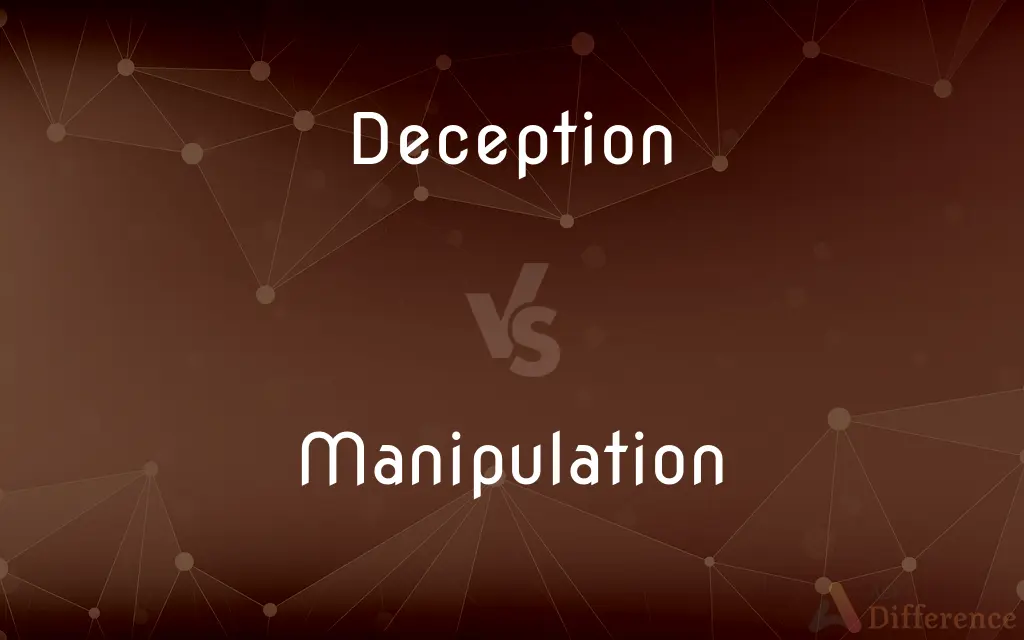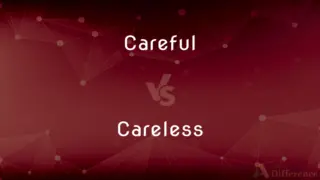Deception vs. Manipulation — What's the Difference?
By Maham Liaqat & Fiza Rafique — Updated on April 4, 2024
Deception involves misleading someone by concealing or distorting the truth. Manipulation goes further, not only misleading but also controlling or influencing others to serve one’s own interests.

Difference Between Deception and Manipulation
Table of Contents
ADVERTISEMENT
Key Differences
Deception is primarily about hiding the truth or presenting falsehoods to mislead someone. This can be through lies, omission, or misleading facts. Whereas, manipulation involves influencing or controlling someone to achieve a personal goal, often using deceit as a tool, but also employing psychological tricks, persuasion, and emotional exploitation.
While deception might not always have a direct goal beyond the act of misleading, manipulation is purpose-driven, aiming to alter someone's behavior or decisions for the manipulator's benefit. Deception can be a component of manipulation, but manipulation encompasses a broader set of strategies, including coercion and persuasion.
Deception can occur without any ongoing relationship or emotional connection between the deceiver and the deceived. It can be as simple as a false statement with no further implications. On the other hand, manipulation often requires some level of engagement or relationship, leveraging this to exert influence or control over someone.
A deceptive act does not always result in the deceiver gaining power over the deceived, it may simply mislead or cause misunderstanding. However, manipulation aims at gaining power, control, or advantages, often altering the behavior or perception of the manipulated in significant ways.
While deception is about misleading to hide the truth, manipulation is about controlling or influencing others, often using deceit among other tactics, to serve the manipulator's interests.
ADVERTISEMENT
Comparison Chart
Definition
Misleading by concealing or distorting the truth
Influencing or controlling others to serve one’s interests
Goal
To mislead
To alter behavior or decisions for personal gain
Strategies
Lies, omission, misleading facts
Deceit, psychological tricks, persuasion, emotional exploitation
Relationship
Not necessary
Often requires some level of relationship or engagement
Outcome
Misunderstanding or misinformation
Gaining power, control, or advantages over others
Compare with Definitions
Deception
Lies, omission, or presenting misleading facts.
She practiced deception by omitting key facts from her story.
Manipulation
Exerting influence or control over others for personal gain.
His manipulation of the situation benefited his agenda.
Deception
Can occur in various contexts, from personal relationships to professional environments.
Deception in marketing can lead to consumer distrust.
Manipulation
To alter someone’s behavior or decisions to one’s advantage.
Through manipulation, he convinced them to support his project.
Deception
To mislead or cause someone to believe something that is not true.
His deception led them to the wrong conclusion.
Manipulation
Using emotional exploitation, psychological tricks, or deceit.
She used manipulation by guilt-tripping her friend into agreeing.
Deception
The act of hiding the truth or presenting falsehoods.
The spy used deception to conceal his true identity.
Manipulation
Results in the manipulator gaining power, control, or advantages.
Her manipulation led to her gaining more influence in the group.
Deception
Often results in misunderstanding or misinformation.
The deception caused confusion among the team members.
Manipulation
Requires some level of relationship or psychological engagement.
Manipulation is common in toxic relationships.
Deception
Deception or falsehood is an act or statement which misleads, hides the truth, or promotes a belief, concept, or idea that is not true. It is often done for personal gain or advantage.
Manipulation
The act or practice of manipulating.
Deception
The use of deceit.
Manipulation
The state of being manipulated.
Deception
The fact or state of being deceived.
Manipulation
Shrewd or devious management, especially for one's own advantage.
Deception
A ruse; a trick.
Manipulation
The practice of manipulating or the state of being manipulated.
The dealer's manipulations could have removed cards from the deck.
Deception
An instance of actions and/or schemes fabricated to mislead someone into believing a lie or inaccuracy.
Manipulation
The skillful use of the hands in, for example, chiropractic.
After a few minutes of manipulation each week, she obtained days of relief from her neck pain.
Deception
The act of deceiving or misleading.
Manipulation
The usage of psychological influence over a person, event, or situation to gain a desired outcome.
The counselor was able to reach the disturbed teen through positive psychological manipulation.
Through subtle manipulations he orchestrated the downfall of his rival.
Deception
The state of being deceived or misled.
There is one thing relating either to the action or enjoyments of man in which he is not liable to deception.
Manipulation
The act or process of manipulating, or the state of being manipulated; the act of handling work by hand; use of the hands, in an artistic or skillful manner, in science or art.
Manipulation is to the chemist like the external senses to the mind.
Deception
That which deceives or is intended to deceive; false representation; artifice; cheat; fraud.
There was of course room for vast deception.
Manipulation
The use of the hands in mesmeric operations.
Deception
A misleading falsehood
Manipulation
Artful management; as, the manipulation of political bodies; sometimes, a management or treatment for purposes of deception or fraud.
Deception
The act of deceiving
Manipulation
Exerting shrewd or devious influence especially for one's own advantage;
His manipulation of his friends was scandalous
Deception
An illusory feat; considered magical by naive observers
Manipulation
The action of touching with the hands or the skillful use of the hands
Common Curiosities
How do manipulators use deception?
Manipulators use deception as one of their tools to mislead and create situations that serve their interests, often alongside other strategies.
Is manipulation always negative?
While manipulation is often viewed negatively due to its association with selfish or harmful motives, some argue that it can be used for positive outcomes in certain contexts.
Can someone be manipulative without being deceptive?
Yes, manipulation can also involve coercion, persuasion, or exploiting emotional vulnerabilities without outright deception.
What makes manipulation effective?
Manipulation is effective due to its ability to exploit emotional vulnerabilities, psychological weaknesses, or the trust and relationship between the manipulator and the victim.
How can one protect themselves from being manipulated?
Awareness, setting boundaries, and seeking objective advice can help protect against manipulation.
What is the key difference between deception and manipulation?
Deception is about misleading, while manipulation involves controlling or influencing others, often using deceit as one tool among others.
What are the consequences of deception?
The consequences can include loss of trust, confusion, and misunderstanding among those deceived.
Can businesses be guilty of manipulation?
Yes, businesses can engage in manipulation through marketing tactics, misleading information, or coercive strategies to influence consumer behavior.
Can deception occur without manipulation?
Yes, deception can occur on its own, simply by misleading someone without necessarily influencing or controlling them.
Are there legal implications for deception or manipulation?
Yes, depending on the context, both deception and manipulation can have legal implications, especially in contractual, financial, or consumer rights areas.
How does technology impact deception and manipulation?
Technology amplifies the reach and sophistication of both deception and manipulation, from fake news to social media algorithms designed to influence behavior.
Is there a way to ethically use principles of manipulation in persuasion?
Ethical persuasion involves clear communication, respect for the other’s autonomy, and transparency, distinguishing it from manipulative practices.
What psychological tactics are commonly used in manipulation?
Tactics include gaslighting, guilt-tripping, flattery, and playing on emotions such as fear, insecurity, or sympathy.
Is it possible to have a relationship without any form of deception or manipulation?
While complete honesty is ideal, minor deceptions or manipulations can occur in relationships, often unconsciously. The goal is to maintain transparency and integrity as much as possible.
How do societal norms influence perceptions of manipulation and deception?
Societal norms and cultural values play a significant role in defining what is considered acceptable manipulation or deception, varying greatly across different cultures and contexts.
Share Your Discovery

Previous Comparison
Careful vs. Careless
Next Comparison
Arbor vs. ArbourAuthor Spotlight
Written by
Maham LiaqatCo-written by
Fiza RafiqueFiza Rafique is a skilled content writer at AskDifference.com, where she meticulously refines and enhances written pieces. Drawing from her vast editorial expertise, Fiza ensures clarity, accuracy, and precision in every article. Passionate about language, she continually seeks to elevate the quality of content for readers worldwide.
















































